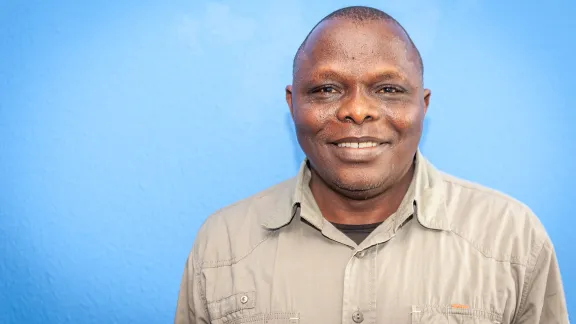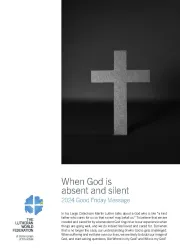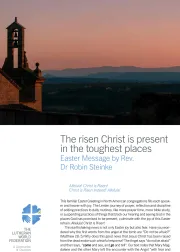New Regional Secretary for Africa, Rev. Dr Samuel Dawai reflects on the liberating message of the gospel

New LWF Regional Secretary for Africa, Rev. Dr Samuel Dawai of the Church of the Lutheran Brethren of Cameroon. Photo: LWF/S. Gallay
Interview with Regional Secretary: Rev. Dr Samuel Dawai
(LWI) - The Lutheran World Federation (LWF) Regional Secretary for Africa, Rev. Dr Samuel Dawai of the Church of the Lutheran Brethren of Cameroon (EFLC) took up his role in July this year. Dawai, a New Testament scholar has served his home church for 26 years as a parish pastor, biblical scholar and director of the EFLC’s Kaélé Seminary in Northern Cameroon. As regional secretary, he is responsible for the 31 LWF member churches in 23 countries in Africa, from his office based in Yaoundé, where he sits in the office of the LWF country program in Cameroon.
In this interview he shares his journey to academia and the LWF, and his vision for the region.
Tell us about your religious and spiritual upbringing?
My parents became Christians as adults. My father served the church as a deacon, taking care of small communities within the church, but it was my mother who taught us to pray. Church programs like Sunday school, youth groups, Bible studies and evangelism in the villages where there was no church also shaped me.
I grew up mostly in the village and partly in the city. In the village, everyone is religious; which implies that the connection to African tradition and spirituality sets the rhythm of life. This African spiritual environment formed us as well as Christianity and kept us in a relationship. These religious activities and rhythms of life shaped our life together, including events that involved the entire community such as planting and harvesting, child naming, marriage, and mourning the death of loved ones, among others. These rituals give order to our daily lives and provide a meeting point for an African religious environment and a Christian religious environment. Both connect us to God.
Is this what led to your entering the ministry?
In 1991, I was asked to lead the youth group in my congregation. It was during this time that questions of becoming a pastor began to grow in me, such as “Why not serve the Lord? Why not serve God as in the church?” Following talks with two pastors who convinced me that I could serve the Lord, I pursued theological education. Later, my theological studies answered those earlier questions and confirmed my call.
I taught at the seminary for 15 years. I have a love, and passion for teaching, but now it is time to change, to this new calling.
Tell us more about your background in theological education?
My pastoral and theological training started in 1993 at the Kaélé Seminary where I obtained my pastor's diploma in 1996. I continued my theological studies at the Faculty of Protestant Theology in Yaoundé where I obtained my Bachelor's degree in 1998 and my Master's degree in 1999. After serving in a parish for three years, I joined the Faculty of Theology of the Protestant University of Central Africa in Yaoundé for my doctoral studies, which I completed with a PhD in 2007. My doctoral studies included a stay at the Protestant Faculty of Theology in Montpellier, France. To this, I must add my participation in a number of theological seminars organized by the LWF from which I learned a lot about Lutheranism.
What was it like, teaching theology?
I have spent the better part of my career teaching theology. I taught New Testament theology both in the Protestant School of Theology in Maroua and the EFLC seminary in Kaélé. I was passionate not only about the gift of imparting knowledge to students, but more importantly, about sharing knowledge about the gospel, discussing Christian faith and experience from a Lutheran perspective. My passion was not only to talk about Jesus, the apostles, the early church, but also to engage the students in what it means for us today to be Lutheran Christians, especially in the African cultural, social and economic contexts.
In my journey as a teacher of theological education, I have learned that the teacher is first of all a learner. One must always question what they already know in order to learn more. Also, theological reflection or biblical interpretation is contextual, hence every theologian must always approach teaching with a spirit of openness and humility. If God is the object of theological reflection, we must make ourselves small in order to understand God better. I have also learned that for theological education to be effective, it must have a meaningful impact for pastors, and it must be accompanied by a true spiritual relationship with God.
You talked earlier about a meeting point between African traditional religion and Christianity, what is your experience when it comes to theological education?
My spiritual and theological journey, like many other African Christians, has enabled me to understand that in Africa, it is essential for theological education to enter into dialogue with African traditional religion. The person with whom we share the gospel is not in a spiritual or religious vacuum. He or she receives a gospel that is infused with culture, and therefore it is not easy to completely separate what is cultural and religious in a Cameroonian and African context, so to speak. Hence the need to ask the question: “What is the relationship between the gospel message and culture?"
Indeed, despite the development of Western culture and Christianity, African systems of values, thought and beliefs impact everyday life. These systems are expressed in myths, tales, morals and proverbs that convey philosophical and religious values to endorse or condemn the actions of the living. They are processes that constitute both opportunities for theological expression and challenges to Christian faith and theology.
Can you give some examples?
Let me share this English translation of a Cameroonian proverb: “The guinea fowl without chicks is nothing but shiny feathers.” It is used to explain that a woman without children is a woman without honor and real femininity, and to promote a strong belief that a marriage only has real value if the woman can provide her husband with offspring. Similarly, a woman who does not have children will be shamed in society. The challenge for the African theologian is to effectively demonstrate that such a belief is contrary to Christian ethics and values. On the other hand, a story, a rite, a dance, a parable, can serve as an opportunity for catechesis, composition of hymns, and other forms of teaching, in order to convey the liberating message of the Gospel of Jesus Christ.
Other examples of African beliefs that pose enormous challenges to theology include the conviction that water and living creatures— plants and all animals— are inhabited by spirits, which is conducive to a life filled with fear or to the development of syncretism in the lives of Christians.
Another example is the scale of values (what is good or bad): for example, there are cultures in which the notion of guilt is non-existent, but people instead have the notion of shame. The challenge here is to develop new theological expressions that can be accepted and understood.
When it comes to the rituals and ceremonies that mark the main events of life, (birth, marriage, death, burial and so on), here again, how can these be integrated into the liturgy of the church?
To this cultural and religious reality, we must also add the achievements that have been made since the times of the missionaries, and which need to be studied again.
The multiple challenges to theology require a contextual approach. This contextual approach is not to impose ready-made theological notions constructed in a Western context, but to formulate the biblical and gospel message in an already existing cultural and religious content. Therefore, theological institutions in Africa need to develop more of a theology of life that responds to the spiritual, social and economic needs of the local people.
As regional secretary, what would you like to bring to LWF’s member churches in Africa?
My wish for Lutheran churches in the African region is to see them strengthen the understanding of leadership that makes the church sustainable. I am happy that this discussion has been going on in the LWF. This includes supporting the churches in their strategic efforts to move toward economic and financial autonomy.
What I can bring is listening and accompanying them in their moments of joy and celebrations and challenges: encouraging them to implement the values promoted by the LWF and respecting the rules of procedure in the area of resource sharing such as scholarships and support for development projects.
Of course, there are other challenges that affect all churches and religious organizations. In Africa, there is rapid development of the revival, neo-Pentecostal churches, which carry deceptive theologies for the people. Prosperity theology, for instance, drains our youth. Many say they believe in Jesus and expect wealth, only to find that they have been sold false dreams.
Through theological education, the churches in Africa must re-educate people on basic Christian concepts of faith such as resurrection, grace and love. For me, resurrection means victory over the forces of darkness and evil. If our Christians understood this correctly, many would not run to the false prophets who multiply every day in Africa. To understand grace correctly is to live with freedom from guilt and from the dictatorship of perfection. Understanding love would strengthen our contribution to seeking peace where there is conflict.
My wish is to see our theological institutions train qualified teachers who teach the liberating Gospel of Christ to future pastors so that they will be able to impart this message to their congregations.
How do you see the connection between member churches and LWF’s global mission?
Without member churches, there is no communion. It is because of the churches that there is an LWF and its mission as a communion of churches. I think of the image the Apostle Paul gives in the Epistle to the Corinthians, where he talks about the church as a body with different members, and each member has its role, and between its members there is synergy, and this communion gives each member that synergy. There is solidarity and synergy such that without the members, the communion relations and the humanitarian work of the LWF would not be possible.
Regional Secretaries are a part of the Office of the General Secretary, where they serve as the Communion Office primary entry point for LWF’s 149 member churches, with a focus on communion relations, connecting local, regional and global expressions of the LWF. There are four regional secretaries for the seven LWF regions: Africa, Asia, Central Eastern Europe, Central Western Europe, Latin America and the Caribbean, Nordic Countries and North America.
This is the first in a series of interviews with all four LWF Regional Secretaries.


